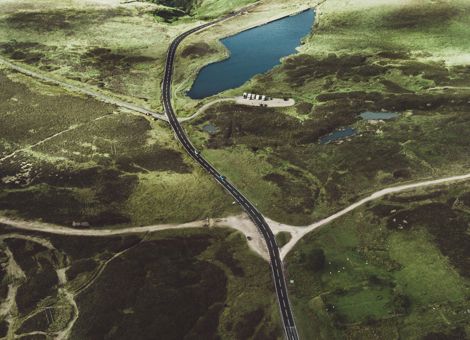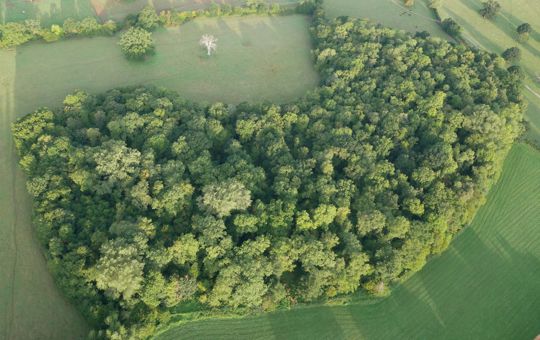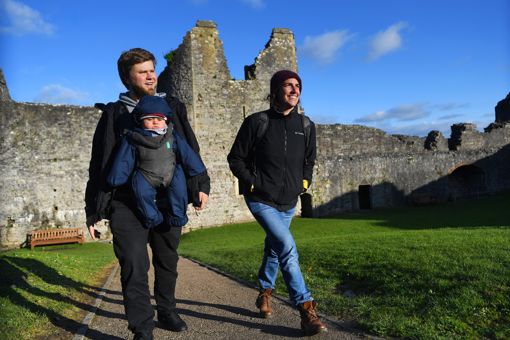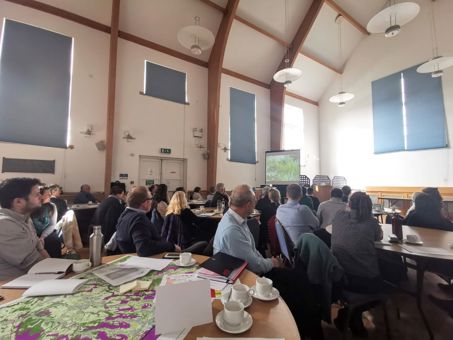Climate Ready Gwent
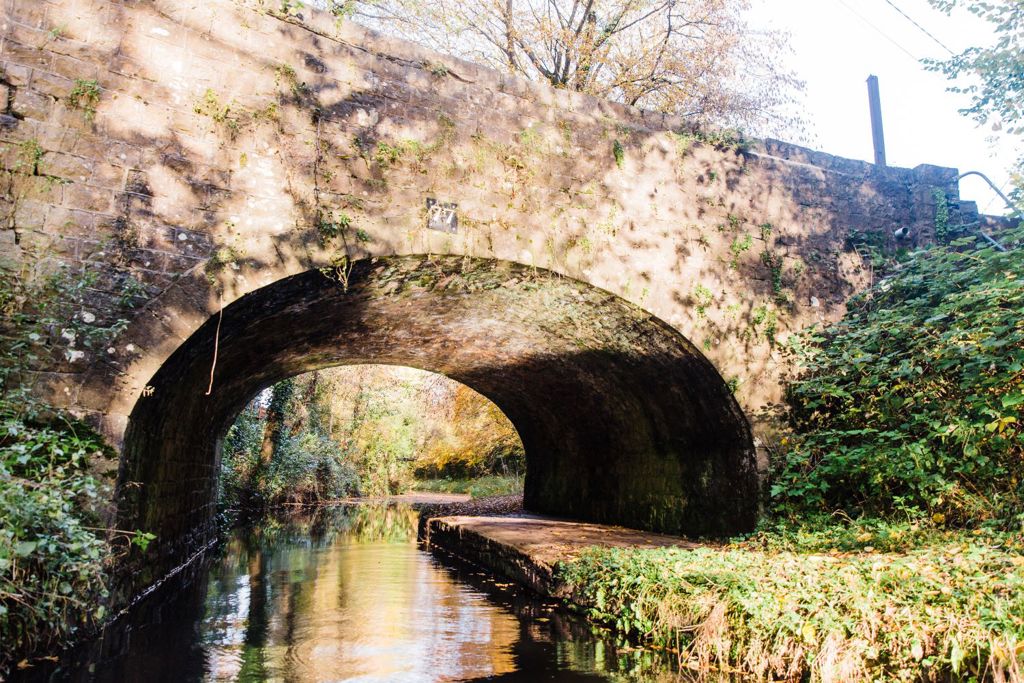
© Crown copyright (2019) Wales
Why this theme?
Climate change is the globally defining challenge of our time. Our changing climate will affect our communities, the services we deliver, our assets and infrastructure. It is clear from the work we have undertaken relating to this strategic theme that the changing climate necessitates changing the ways in which we work together to address it.
The potential risks of climate change are far and wide-ranging, with the potential to affect all biodiversity and how it interacts within the world. The climate is changing rapidly and in 2019, Welsh Government declared a climate emergency. Biodiversity and well-functioning ecosystems provide natural solutions to build community resilience, support livelihoods, improve well-being and contribute to sustainable development.
The 'Climate Ready Gwent' strategic theme focuses on taking every opportunity to address the root cause of issues and to do so collaboratively as partners, shifting the focus from risk to opportunity and putting communities at the centre. The 'Climate Ready Gwent' themed network has explored how and where we can work better together to act on the causes and adapt to the consequences of climate change.
During an extended period of hot weather in 2018, Gwent experienced several wildfires. The impact and damage to habitats and species was devastating and the scars still linger on the landscape. These extreme weather events placed a significant strain on both emergency services and the public sector purse. Working with partners in this area has allowed us to identify several climate risks that are specific to the Gwent region and need addressing. These include risks to; individuals, residents and communities, infrastructure and the built environment, public water supplies from drought and low flows particularly in the rural environment, ecosystems and agriculture businesses from changes in climatic conditions. People and communities who are worst-affected by extreme weather events may be the least likely to be heard in planning and delivery decisions relating to climate adaptation and mitigation.
What would success look like?
| What success looks like | The vision for South East |
|---|---|
| Natural resources are not continuously declining and are not being used faster than they can be replenished |
Opportunities to develop a more a circular economy are realised. This means developing an economic system aimed at eliminating waste and the continual use of resources. Resources are kept in use for as long as possible, extracting the maximum value whilst in use, then products and materials are recovered and regenerated at the end of each service life. Education and skills development provide the opportunity for new jobs and innovation, cost savings for businesses and the ability to strengthen our supply chains, improving our local economic resilience |
| The health and resilience of our ecosystems across the four attributes of ecosystem resilience is not being compromised and where there is a need, is being enhanced | Biodiversity is protected, enhanced and resilient to a changing climate, water and air quality is good, soils are healthy and ecological connectivity is maximised. Opportunities to sequester carbon and decrease greenhouse gas emissions incorporate biodiversity as a fundamental and underlying principle. Conflicts between ‘action for climate’ and ‘action for biodiversity’ are anticipated and avoided - for example, tree canopy cover is increased where appropriate to do so and not in locations that would have an adverse effect on Natura 2000 sites (a network of sites designated to ensure the long-term survival of Europe's most valuable and threatened species and habitats) |
| Natural resources are being used efficiently and the supply of different ecosystem services is being optimised for well-being | A globally responsible Wales: Support for communities to reduce their own greenhouse gas emissions has been distributed in a socially just way. Transport is carbon neutral. Carbon sequestration and decarbonisation activity is a vital and integrated part of our local green economy, providing multiple benefits within and for our communities and supporting the localised green economy |
| The benefits derived from natural resources are being fairly and equitably distributed and the contribution they make to well-being is meeting our basic needs and is not declining now or in the long term | Vulnerable people are adequately protected from the effects of climate change. Nature-based solutions to climate adaptation contribute towards increase in local resilience to the impacts of climate change. Communities are educated about climate risk and active in designing and implementing the response. Communities are more resilient to rising energy and transport costs through improved efficiency, tackling fuel poverty, active travel and more local renewable energy generation |
What are the next steps/actions?
Adaptation outcome:
Improved health and resilience of our ecosystems to maximise their ability to protect, prevent and reduce climate impact across Gwent
- Maintain, enhance and restore floodplains and hydrological systems to reduce flood risk and improve water quality and quantity (key spatial opportunities: the lower stretches of Wye, Usk and Afon Lwyd, Gwent levels and Caerphilly)
- Ensure peatlands are well managed, retain their moisture and are sustainable as carbon sinks and stores (key spatial opportunities: the South East Wales resilient uplands and Brecon Beacons National Park)
- Increase tree canopy cover and hedgerows where appropriate to do so (key spatial opportunities: various, but include the Wye valley, Central Monmouthshire and the urban environment)
- Increase use of green infrastructure to reduce impact of climate-related environmental hazard (e.g. Sustainable Urban Drainage Systems (SUDS))
- Adequately account for sea level rise impacts on the Gwent levels in the Shoreline Management Plan, as identified by climate prediction modelling following the high emissions scenario
- Work with land-owners and managers to identify where land could be managed differently to sequester carbon and build resilience
- Develop a methodology or criteria (which accounts for a high emissions climate prediction scenario) for identifying where non-main rivers could implement natural flood risk management opportunities to greatest effect
Mitigation outcome:
Improved resource efficiency, with necessary steps taken towards decarbonisation across Gwent
- Work with land-owners and managers to identify where land could be managed differently to sequester carbon and build resilience
- Embed Carbon Positive across the public sector and share practice with third and private sector where appropriate to reduce carbon emissions and improve air quality
- Support the deployment of infrastructure for low emission vehicles
- Develop a public sector plan for decarbonising the Gwent fleet (following the public sector fleet review)
Adaptation outcome:
Increased understanding of the climate change risks and opportunities across Gwent
- Explore methods of involving communities and/or sectors who will be most affected by future change in the region in developing their own vision for climate action
- Enable opportunities for citizens to challenge and scrutinise progress on actions
- Provide the necessary level of commitment, ambition and leadership required to drive climate action
- Work together to identify plans, strategies and approaches to service delivery which need to change in order to drive and embed climate action
- Work together to develop consistent monitoring and evaluation frameworks which measure the changes to policy and practice regarding climate action
- Develop a common methodology for identifying opportunities and assessing where management of the public sector estate can build resilience to the impacts of climate change and maximise the opportunities for carbon sequestration without having a negative impact on biodiversity
- Develop a themed network of practitioners, researchers, key stakeholders and relevant agencies (and where applicable communities) to develop a shared understanding of nature-based solutions to climate adaptation
- Work together to develop, populate and use common data sets which will enable organisations to baseline evidence relating to nature-based solutions to climate adaptation
Mitigation outcome:
Increased understanding of the need to reduce greenhouse gas emissions across Gwent
- Explore methods of involving communities and/or sectors who will be most affected by future change in the region in developing their own vision for climate action
- Enable opportunities for citizens to challenge and scrutinise progress on actions
- Provide the necessary level of commitment, ambition and leadership required to drive climate action
- Work together to identify plans, strategies and approaches to service delivery which need to change in order to drive and embed climate action
- Work together to develop consistent monitoring and evaluation frameworks which measure the changes to policy and practice regarding climate action
- Develop a common methodology for identifying opportunities and assessing where management of the public sector estate can build resilience to the impacts of climate change and maximise the opportunities for carbon sequestration without having a negative impact on biodiversity
- Develop a themed network of practitioners, researchers, key stakeholders and relevant agencies (and where applicable communities) to develop a shared understanding of the need to reduce greenhouse gas emissions across Gwent
- Work together to develop, populate and use common data sets which will enable organisations to baseline evidence relating to the public sector carbon footprint
Adaptation outcome:
Increased capacity of organisations and individuals, ensuring that they have the tools, skills and guidance necessary to allow them to adapt to the impacts of climate change across Gwent
-
Work together to develop a toolkit and consolidate best practice, advice and guidance for; natural flood risk management, sustainable upland management, Sustainable Urban Drainage Systems (SUDS), floodplain restoration and woodland management solutions to climate adaptation and share across the public, third and private sectors as appropriate
-
Develop and deliver skills training for nature-based solutions to climate adaptation across the public, third and private sector as appropriate
-
Work together to identify funding streams which can enable place-based delivery of outputs that improve the health of natural areas and the benefits they provide
-
Work together to develop a multi-sector and cross organisational regional adaptation strategy and action plan for Gwent. This strategy will identify how and where organisations can work better together at the regional scale to safeguard and enhance ecosystem resilience in the landscape
These strategies and plans will be used as a blue print to deliver the theme specific actions identified above and in so doing will
-
Ensure that identified interventions are well co-ordinated between agencies and that strong governance and accountability pathways are in place
-
Ensure agreed common methodologies are socially just and account for the additional needs of disadvantaged and vulnerable communities
-
Identify where and how regional collaboration can build resilience
-
Contribute to the development of a common evidence base for nature-based solutions to climate adaptation
-
Identify mechanisms for effective partnership working arrangements at a larger scale where required (e.g. water resources, flood risk management and upland/grassland management)
-
Inform public sector asset management, procurement and financial planning practices
-
Explore new ways of working and scale up success
-
Ensure that identified interventions are well co-ordinated between agencies and that strong governance and accountability pathways are in place
-
Ensure agreed common methodologies are socially just and account for the additional needs of disadvantaged and vulnerable communities
-
Identify where and how regional collaboration can build resilience
-
Work with the third sector organisations with interest and experience in land management for nature to develop a scheme whereby they are resourced to advise on land management decisions from within communities, including identifying opportunities to develop networks and nature-based solutions to climate adaptation and carbon sequestration, focusing initially on publicly managed land at the local scale with community and town councils
Mitigation outcome:
Improved resource efficiency, with necessary steps taken towards decarbonisation across Gwent
-
Work together to develop a toolkit and consolidate best practice, advice and guidance for resource efficiency and decarbonisation and share across the public, third and private sectors as appropriate
-
Develop and deliver skills training for improving resource efficiency, decarbonisation and renewable energy across the public, third and private sector where appropriate
- Work together to identify funding streams which can enable place-based delivery of outputs that improve the resource efficiency and decarbonisation of assets and promote renewable energy
- Work together to develop a multi-sector and cross organisational multi-sector and cross organisational regional carbon mitigation strategy and action plan for Gwent. This strategy will identify how and where organisations can work better together at the regional scale to decarbonise the public sector and increase resource efficiency (energy sector)
These strategies and plans will be used as a blue print to deliver the theme specific actions identified above and in so doing will:
- Ensure that identified interventions are well co-ordinated between agencies and that strong governance and accountability pathways are in place
- Ensure agreed common methodologies are socially just and account for the additional needs of disadvantaged and vulnerable communities
- Identify where and how regional collaboration can build resilience
- Contribute to the development of a common evidence base for nature-based solutions to climate adaptation
- Inform public sector asset management, procurement and financial planning practices
- Explore new ways of working and scale up success
- Identify mechanisms for effective partnership working arrangements at a larger scale where required (e.g. water resources, flood risk management and upland/grassland management)
-
Work with the third sector organisations with interest and experience in the energy saving sector to develop a scheme whereby they are resourced to advise on facilities management decisions from within communities, including identifying opportunities to improve resource efficiency, focusing initially on publicly managed land at the local scale with community and town councils
Who have we worked with to date?
In 2019, working through the Gwent Strategic Well-being Action Group (GSWAG), the Climate ready Gwent themed network facilitated a series of involvement opportunities for the public and third sectors and communities, designed to improve collective understanding of local and regional climate resilience. This project worked with focused, diverse groups to learn from the lived experience of past extreme weather events in order to identify methods to improve future climate resilience.
This project, “Adapting to Climate Change: From Lived Experience to Strategic Action”, worked with people and places throughout Gwent who were brought together through existing partnership connections, including the Blaenau Gwent Children’s Grand Council, the Blaenau Gwent Older People’s Forum, Blaenavon Town Council, Blaenavon World Heritage Site (WHS), Transition Monmouth, Living Levels Partnership, Goldcliff Town Council, Gwent’s agricultural community and stakeholders in the Cwmcarn and Abercarn areas.
The 'Climate Ready Gwent' network has also been working through established Public Services Boards links to facilitate decarbonisation of the public sector by sharing learning and best practice from NRW's Carbon Positive project with our public sector colleagues. Working specifically with local fleet, asset, finance and data managers, we have also delivered a number of demonstrator decarbonisation projects across the region.
How do we think the areas of work we’ve proposed will help deliver SMNR?
The outcomes under each of the four strategic themes will deliver the Area Statement vision for South East. While each theme has its own vision for South East, each is part of the same overarching approach to delivering the Sustainable Management of Natural Resources in place.
The South East Area Statement is representative of more collaborative, integrated and involved ways of working. It is a representation of the work we have done in Gwent over the past two years to strengthen the ways we work together differently, within our own organisations and as partners.
In South East, we set out to produce an Area Statement which informs internal and external planning at the appropriate scale and helps stakeholders to consider ways of working together differently when doing so. The Area Statement process is adaptive and will help to explore and shape aspirational ways of working.
Themed networks will continue to focus on working together differently to build ecosystem resilience. Each network will work together to develop a common evidence base as well as facilitate preventative interventions over the longer term.

How can people get involved?
If you would like to get involved in the delivery of the actions listed here, contribute to the developing themed network, or share your own images and stories of climate impact in please contact us.
Give us your feedback

